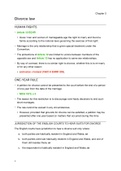Chapter 3
Divorce law
HUMAN RIGHTS
- Article 12 ECHR
• Gives ‘men and women of marriageable age the right to marry and found a
family according to the national laws governing the exercise of that right’.
- Marriage is the only relationship that is given special treatment under the
Convention.
- The protections of Article 12 are limited to unions between members of the
opposite sex and Article 12 has no application to same sex relationships.
- By way of contrast, there is no similar right to divorce, whether this is to re-marry
or for any other reason
• (Johnston v Ireland (1987) 9 EHRR 203).
ONE-YEAR RULE
- A petition for divorce cannot be presented to the court before the end of a period
of one year from the date of the marriage
• MCA 1973, s 3
- The reason for this restriction is to discourage over-hasty decisions to end such
short marriages.
- The rule cannot be waived in any circumstances.
• However, provided that grounds for divorce can be satis ed, a petition may be
presented after one year based on matters that occurred during this time
JURISDICTION OF THE ENGLISH COURTS TO HEAR SUITS FOR DIVORCE
The English courts have jurisdiction to hear a divorce suit only where:
a. both parties are habitually resident in England and Wales; or
b. both parties were last habitually resident in England and Wales, and one of
them still resides there; or
c. the respondent is habitually resident in England and Wales; or
1
fi
, Chapter 3
d. the petitioner is habitually resident in England and Wales and has lived there
for at least a year immediately before the petition is led; or
e. the petitioner is domiciled in England and Wales and has been residing in
England and Wales for at least six months immediately before the petition is
led; or
f. both parties are domiciled in England and Wales; or
g. if none of (a)–(f ) above applies and no court of another EU State has
jurisdiction, either of the parties is domiciled in England and Wales on the
date when the proceedings are begun.
- Example
• Sophie, who is French, marries Tim, who is English. The couple make their
married home in England for 10 years. The marriage breaks down and Sophie
returns home to France; Tim remains in England. Six months later Tim decides
to seek a divorce through the English courts. On the facts, Tim has been
habitually resident and domiciled in England throughout. Sophie has been
habitually resident and in England during the marriage, but she is now both
habitually resident and domiciled in France. The English courts have jurisdiction
to deal with Tim’s divorce on the basis of (b), (d) or (e) above. Tim needs to
satisfy only one basis, and in practice the simplest approach is rely on the rst,
ie (b).
DOMICILE
- A person is said to be domiciled in a territory having a single legal system if he
has his permanent home there.
- Everyone has a domicile and can only have one operative domicile at any one
time. However, a person’s domicile may alter as his circumstances change
throughout his life.
- A person may acquire, and lose, any of three types of domicile:
DOMICILE OF ORIGIN
- A person acquires domicile of origin at birth.
• In the case of a child whose parents are married, it is the father’s domicile. In
the case of a child whose parents are not married, it is the mother’s domicile.
- It is therefore irrelevant where the child was born.
2
fi fi fi
, Chapter 3
- A domicile of origin is never lost, and even though it may not be operative for any
period during which the person acquires a domicile of choice, it will revive if the
domicile of choice is lost until another domicile of choice is acquired.
- Example:
• Maria’s domicile of origin is Italy. She marries an Englishman, Nigel, and moves
to London, intending that England will be her permanent home. Maria acquires
a domicile of choice of England. The marriage breaks down and Maria
permanently leaves England to take up temporary residence in Paris whilst she
contemplates her future. Maria has lost her English domicile of choice. Her
Italian domicile of origin is therefore revived until such time as she acquires a
new domicile of choice.
DOMICILE OF CHOICE
- Every person aged 16 or over may acquire a domicile of choice. This requires,
rst, residence in a country other than the domicile of origin and, secondly, an
intention to remain there, permanently or inde nitely.
- This intention may be shown by becoming a citizen of that country, by the
purchase of a home or by the length of time spent in that country.
- No single factor will be decisive.
DOMICILE OF DEPENDENCE
- A child can acquire an independent domicile only at 16 years of age, or on
marriage under that age. If he is under 16 years old and unmarried, his domicile
will follow his father’s domicile if his parents are married, or his mother’s if his
parents are not married. If married parents separate, the child will acquire the
domicile of the parent with whom he lives.
- Example
• Assume that Maria and Nigel, (in the example above), had a daughter, Olivia,
who lives with Maria after the marriage breaks down. At birth Olivia acquired
her domicile of dependence from Nigel, ie England. After the separation,
Olivia’s domicile follows that of her mother as a domicile of dependence. Olivia
therefore has an Italian domicile of dependence.
RECOGNITION OF FOREIGN DECREES BY THE ENGLISH COURTS
- A relevant factor when dealing with foreign marriages is to check that the English
courts recognise a foreign decree, for example, of divorce.
3
fi
fi





